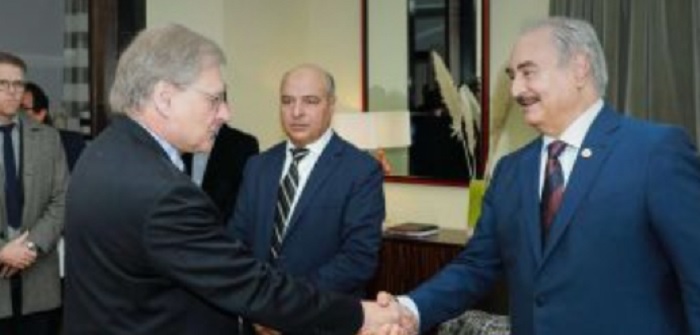
As he shuttles between countries concerned with Libya, Norland reassures Europeans and plays a larger role than a regular ambassador.
US ambassador to Libya, Richard Norland, is leading the political process between the Libyan factions with the aim of reaching a settlement that leads to the formation of a new executive authority, which will end the split in the country and dispel fears of a war over the control of oil.
Norland is shuttling between countries and capitals concerned with Libya. The United States views Libya as a gateway to Africa, in addition to the Libyan file’s intertwining with the crisis in the eastern Mediterranean that had erupted with the Government of National Accord’s signing a Maritime Boundary Demarcation Agreement with Turkey. Norland’s move suggest that he has turned into a “second Secretary of State” mandated (by his boss Mike Pompeo) to devote his efforts full-time to Mediterranean affairs.
Norland started a new diplomatic tour that began with a visit to France and then on to Egypt, to finally land on Thursday in Turkey. “I’m continuing my travel in Ankara today for consultations with Turkey on how best to support de-escalation and the Libyan Political Dialogue in a constructive way that returns full sovereignty to Libya,” he said in a tweet.
This visit comes at a time when countries, led by Egypt and France, are counting on an American role in putting an end to the Turkish intervention in Libya as a goodwill gesture to move forward in the negotiations, especially since there is an impression that the Turkish rush in Libya is due to the presence of an American green light that had encouraged Ankara’s direct intervention in Libya to counter Russian influence. Ambassador Norland had previously said in media statements that the Turkish intervention in the Libyan conflict was a response to the intervention of the Russian mercenaries of the Wagner Group.
The American ambassador arrived in Cairo on Sunday for a three-day visit and held a series of meetings with Egyptian officials, including the head of the Egyptian General Intelligence Service, Abbas Kamel, in addition to meeting with the Speaker of the Libyan Parliament, Aguila Saleh.
Before going to Cairo, the US ennvoy published a photo of him being received in Paris, where he held talks with the Elysée in the context of searching for a solution to the Libyan crisis.
It seems clear that Norland has succeeded in the task of persuading the Europeans, especially France, of the American vision for a solution to the Libyan crisis, which aims primarily to put an end to Russia’s ambitions to establish a foothold in Libya. That aim was reflected statements last week by the French Foreign Minister, John Yves Le Drian, in which he accused Moscow and Ankara of seeking to obstruct the path of the political settlement in Libya.
Russia had indeed taken advantage of the American retreat from the Libya file and of Europe’s disunity in Libya to expand its influence in Libya by supporting the Libyan National Army (LNA) led by Field Marshal Khalifa Haftar, amid accusations of deploying mercenaries of the private security group Wagner to fight alongside the LNA against militias and armed Islamic groups in Tripoli.
Norland’s success in reassuring the Europeans appears to be linked primarily to the recent showing of US bias towards France and Greece in the eastern Mediterranean issue at the expense of Turkey. Paris and Athens for their part are betting on the new Libyan government to cancel the maritime border demarcation agreement with Ankara.
The US position forced Turkey to stop its provocations in the eastern Mediterranean, as it announced on Tuesday the withdrawal of its exploration ship stationed off the coast of Cyprus, in a move that could help bring down tensions in the eastern Mediterranean.
Norland took office as US Ambassador to Libya in August of last year, about four months after the LNA began an offensive to control the capital, Tripoli. His appointment reflected American efforts to fill the vacuum created by the administration of US President Donald Trump, which did not pay enough attention to the Libyan file despite its keenness to appoint the charge d’affaires in The US embassy, Stephanie Williams, as deputy to the resigning UN envoy in Libya, Ghassan Salamé. Williams is now the acting head of the UN mission.
The US position on the Libyan crisis was not clear until after Norland assumed his duties, a position that was in line with the policy of former US President Barack Obama’s administration, which wagered on the Islamists and sympathised with militias and armed groups.
Despite the important breakthroughs that Norland has achieved since taking office, as he was able to impose a ceasefire and remove the LNA from the vicinity of Tripoli in addition to moving forward with the political process, the success of his efforts remains linked to his ability to convince Russia of the US vision for a solution, especially in light of recent war threats by Moscow’s ally, the Libyan National Army.
